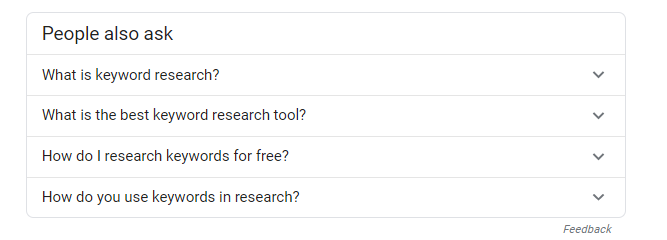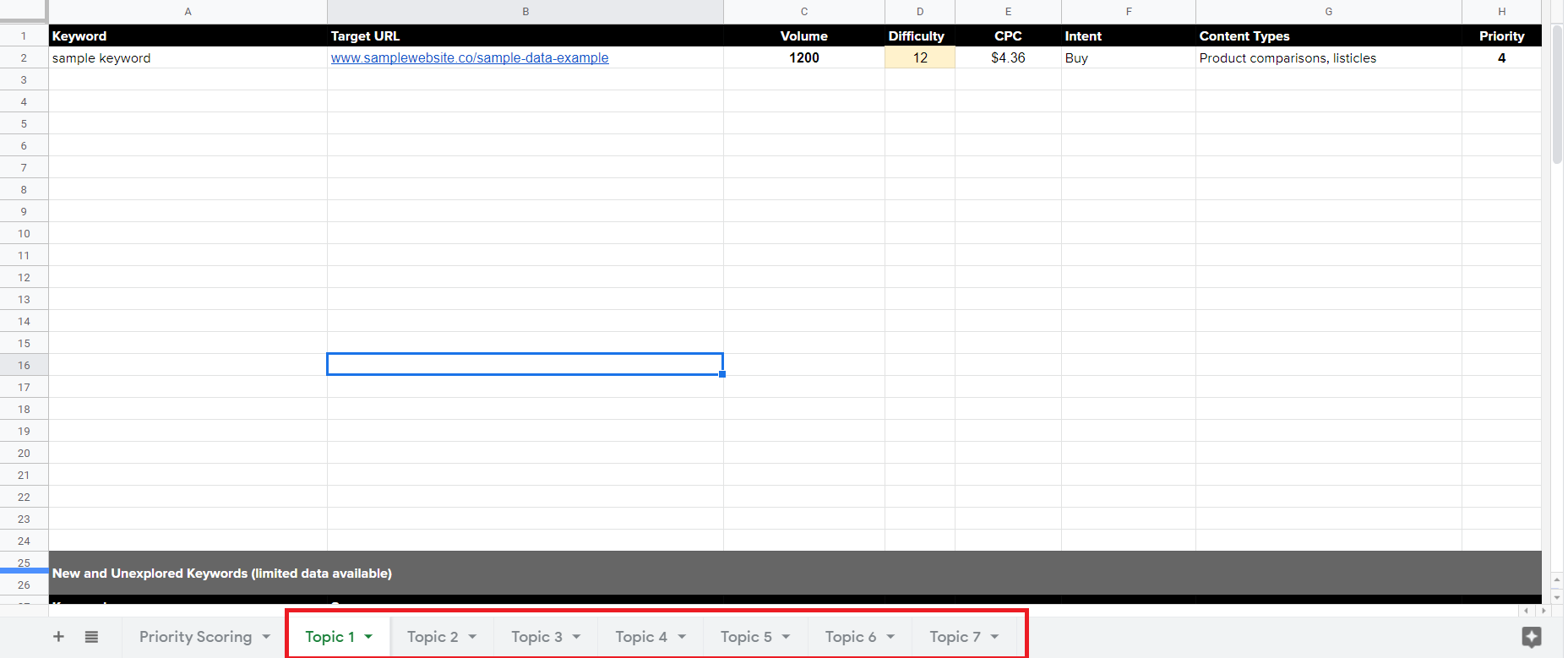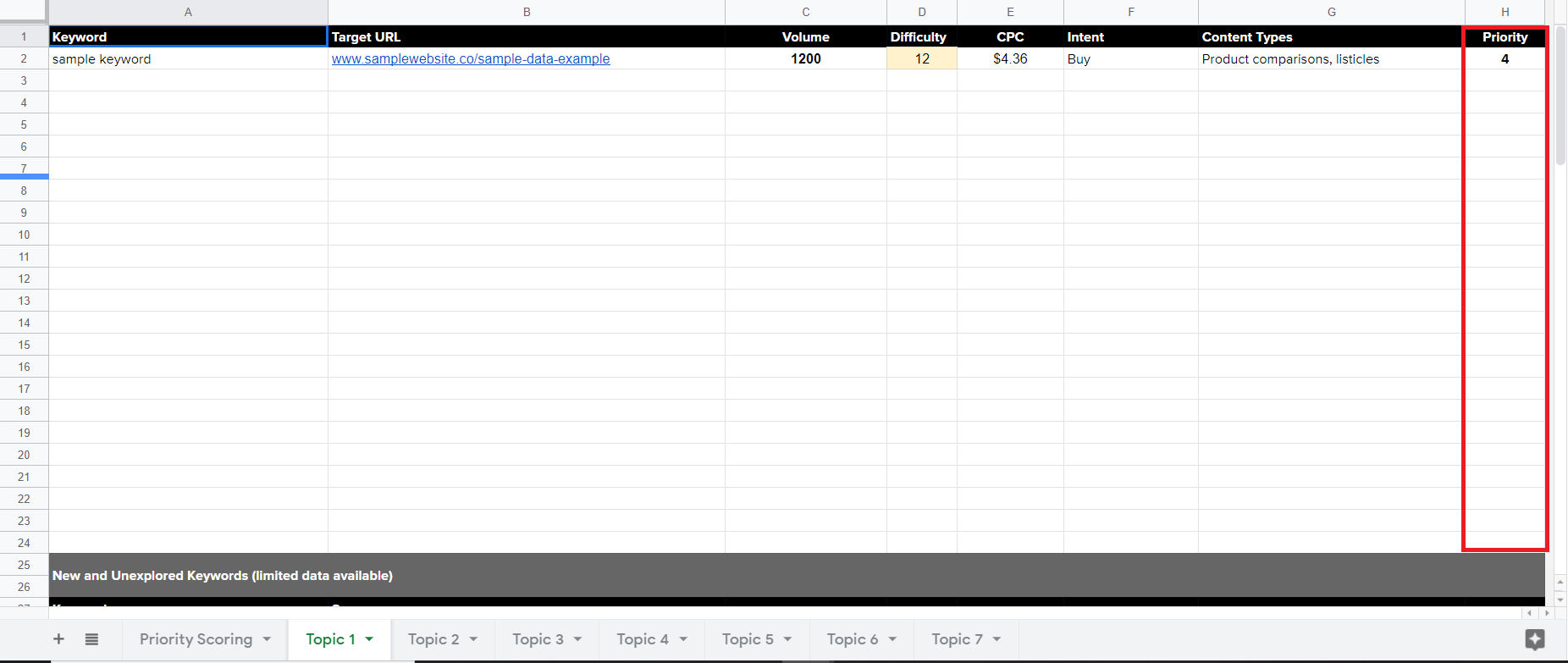Table of Contents
Keyword research is essential to doing good SEO.
You can and should have outstanding content. You can and should also have a great website and overall user experience. But if you’re not strategic about the topics and keywords you’re targeting, you’ll be sailing a ship without a rudder.
But if you’re new to keyword research, you’ll probably notice something.
Trying to track down the “best” way to do keyword research is like trying to find the “best” way to get in shape: there’s no real consensus. And, while each method will probably work to some extent, different ways may work better or worse depending on your own situation.
With that in mind, we’re going to cover our approach to keyword research based on how we think about keywords and topics more broadly. We’ll cover both the “how” and “why,” taking you through the process from start to finish.
Our Philosophy on Keyword Strategy
Before we get into tools and tactics, it’s a good idea to first talk about our philosophy when it comes to keyword research. This will lay the groundwork for the parts that come next.
Quality over quantity. That is, it’s usually better to have a shorter list of highly-relevant, carefully-curated keywords than a long list of so-so keywords. Using these high-quality keywords as our north star helps us focus our content and optimization efforts on the topics that really matter to our clients and their audiences, and that deliver a high ROI.
Relevance is key. More traffic is usually a good thing but we’re not fans of “traffic for the sake of traffic” as a strategy. The keywords in our final keyword spreadsheet should all be very relevant to the client and their target audience. There should be a clear and direct benefit to targeting these keywords as part of our SEO strategy.
Keyword research should serve business goals. Whether that goal is more sales, more brand awareness, more traffic, or something else entirely, the keywords we target should help our clients meet their business goals.
Context matters. This one may be obvious, but context matters when it comes to keyword research. What kinds of content are people hoping to find when they search for this keyword? What are they looking to accomplish? This is also closely tied to relevance. Simply doing a search for what you thought was a highly-relevant keyword may reveal that users are looking for something completely unrelated to what you or your client provides.
The Keyword Research Process
Before we start doing keyword research we’ll first need to thoroughly understand the client’s business, goals, priorities, and industry. Once we’ve taken the time to learn the necessary background information, we can finally move on to gathering our initial keywords.
There are tons of great tutorials around the web covering different ways to gather keywords using tools we cover here. For our purposes, we’re going to focus on the tools themselves and why each is important to our keyword research process.
Tools and Sources for Gathering Keywords
We have some favorite tools, both free and paid, that we find ourselves using consistently in our keyword research. When doing your own keyword research you can use our suggestions or a completely different set of tools that work better for you. The end result is more important than the tools you use to get there.
Here are some of our favorite keyword research tools and a quick overview of each:
Free Keyword Research Tools
Google Autofill, People Also Ask, and Related Searches
Google features are extremely useful for surfacing secondary keywords, brand new keywords, and keywords that otherwise aren’t included in tracking tools. If a keyword is showing up in autofill, PAA, or related searches, there’s search demand there -- even if it doesn’t show up in any of the other tools.

Google Search Console
Google Search Console is a great tool for finding search terms that you or your client is already ranking for but which aren’t necessarily being tracked or targeted. Search terms with a high number of impressions but low click-through rate often represent low-hanging fruit that are ripe for optimization.
Google Trends lets us know whether the search volume for a given term is on the incline, decline, or neither. While it’s not a keystone tool in our toolkit, it can certainly provide helpful context and help us determine the priority of a keyword.
Answer the Public is a staple in the arsenal of SEOs of every stripe. Simply enter a keyword and Answer the Public will provide a visual list of questions you can use to mine keywords and generate content ideas. The tool sources its data from Google’s autosuggest feature.

Quora, Reddit, and Other Forums
Forums are another rich source of information about which questions need answering in the form of better content. We find forums are better for discovering new topics than actual keywords.
Paid Keyword Research Tools
Keywords Everywhere is a Chrome extension used to conduct keyword research on the fly while doing searches on a number of supported sites. Keywords Everywhere provides essential data like volume, CPC, and competitive metrics. Once a free tool, Keywords Everywhere went paid in the fall of 2019.
Ahrefs’ Keywords Explorer feature has robust keyword research capabilities. With each search, you’ll have access to important keyword data, new keyword ideas, and a SERP analysis. The way the Keywords Explorer tool is set up makes it quick and easy to build out hub-and-spoke topics.
Organizing and Formatting Keyword Data
Once we’ve gathered our initial keyword list using the sources outlined above, we’ll need to start the important work of organizing and formatting our keyword data. For this, we’ll use a simple keyword spreadsheet. Once filled out, this spreadsheet will be the final product of our keyword research efforts.
Let’s dig into how our keyword spreadsheet is organized and, more importantly, why we organize it this way.
Organizing Keywords by Topic
The highest level of organization in our spreadsheet is by topic. As SEO has evolved, content strategy has shifted from a focus on targeting disparate individual keywords to a more topic-first approach.
There are several benefits to thinking about content in terms of topics:
- It provides organization and structure to your content strategy
- It helps establish the site as a topical authority
- It improves site architecture
In our keyword spreadsheet, each tab is designated for a single topic. For large sites, tabs can pile up quickly, in which case we’ll create a different spreadsheet for each section of the site (blog, service pages, etc.) and nest them all within the same folder.

Organizing Keywords by User Intent
One of the reasons why all keywords aren’t created equal is that different keywords have different search intent. Some keywords have informational intent while others have immediate transactional intent. Therefore, intent is one of the most important ways in which we organize the keywords on our list.
Each keyword will have one or more types of search intent assigned to it. In our spreadsheet, this attribute is represented by a column that lets us “tag” each keyword with the corresponding intent.
Additional Keyword Attributes
Here’s a breakdown of the columns we include in our keyword research spreadsheet and why each is significant.
Target URL
Every target keyword needs to be mapped to a specific URL. Otherwise, how do we plan to rank for it? By tying a keyword to a page on the site, we know where to look to begin making optimizations.
Search Volume
For obvious reasons, it’s important to have an idea of how many people are actually searching for a given keyword each month. Along with relevance and keyword difficulty, this is one of the primary metrics we look at when evaluating the priority of a keyword.
Difficulty
How difficult is it to rank for the keyword in question? We use the Ahrefs KD metric but you can use whatever tool/metric works for you, as long as you’re consistent and it’s somewhat accurate. A keyword may be highly-relevant with sky-high search volume but if it’s difficult to rank for and your website has very little authority, you may want to reconsider prioritizing it in your SEO efforts.
Cost per Click
Why include cost per click when we’re talking about organic search? Because it clues us into how profitable a keyword is in the short-term. This doesn’t always matter for SEO purposes, especially when talking about top-of-funnel content. Still, it’s a handy piece of information to have.
Content Types
When users search for a keyword, what kinds of content are showing up in the SERP? Chances are if you want to rank well, you’ll have to take some cues from those already ranking in the top slots.
Keyword Priority
Given everything we know about this keyword, what priority should we assign it? In fact, now that we’re on the topic of prioritization, let’s take a closer look at what goes into prioritizing keywords.
Prioritizing Keywords
As the quote by Karen Martin goes, “When everything is a priority, nothing is a priority.” This holds true with keywords. While each of the keywords in our list may be important in its own right, there are always some that are more valuable than others. But how do we go about prioritizing keywords?
Keyword Scoring System
The system we use for scoring and prioritizing keywords is borrowed from the manual analysis done in Daniel Cuttridge’s post on ROI-based keyword research.
Here’s how the keyword scoring system works:
- Keywords should be prioritized based on ROI, whatever ROI means to that business, organization, or individual.
- In order to effectively organize keywords, a certain amount of manual analysis will need to be done.
- To do our manual analysis in a way that’s consistent and somewhat objective, we utilize a scoring system.
And here are the five key metrics we use to assign a priority score. If a metric is favorable, we’ll score it a 1 for that keyword. If it’s unfavorable, we’ll score it a 0. Our end result will be a keyword priority score ranging from 0 - 5.
Domain Rank or Domain Authority of the top 10 results
How high is the average authority of a website in the top 10 results for a keyword? The lower that number is, the better our chances at ranking for that keyword.
Relevance of the top 10 results
How relevant are the top 10 results to your or your client’s website? If a Google search turns up completely irrelevant content to what you’re targeting, you may be barking up the wrong tree.
Average number of referring domains of the top 10 results
What does the link profile look like for the average site in the top 10 results? Does it dwarf yours? If so, it doesn’t disqualify you from competing for the keyword. However, it may make ranking for that keyword a more difficult project.
Search Volume
As we touched on earlier, search volume refers to how many people are searching for a keyword in a given month. Search volume will be weighed against keyword ranking difficulty and relevance.
Business Fit
Ask yourself, is this even a keyword that’s relevant to what you want out of your SEO efforts? A high-volume keyword won’t be much help if the traffic you’ll get isn’t the kind you want.

Making Keyword Research Actionable
Many of us have had the experience of painstakingly creating a spreadsheet/template/important document only to have it sit there, unused, forever. Sometimes it seems like this is actually the default outcome. So how do we avoid having this happen with our keyword research spreadsheet?
Here are a few of the ways in which we make sure our efforts are put to good use:
- Using keyword data as our guide when planning and optimizing website content. Tools can always be used on the fly when optimizing existing content, but a well-organized keyword research spreadsheet helps us plan future content in a way that’s organized and helps us see the big picture.
- Gathering and use this data at the beginning of a client engagement to make clear which keywords are worth pursuing and optimizing. Having a keyword research document present when conducting an SEO audit creates an opportunity to provide insights and recommendations.
- Sharing this spreadsheet and any related information with the client so they too are in the loop about which keywords are most important to their business.
Tying it all Together
With time and repetition, keyword research will become second nature and no doubt you’ll develop your own unique methods for gathering, organizing, and prioritizing keywords. Keyword research isn't always easy and it certainly isn't always fun. However, it'll be an important part of SEO for the foreseeable future. When we bring genuine curiosity to our research and dig deeper than the usual metrics, we can uncover insights that help shape our strategy for the better.


